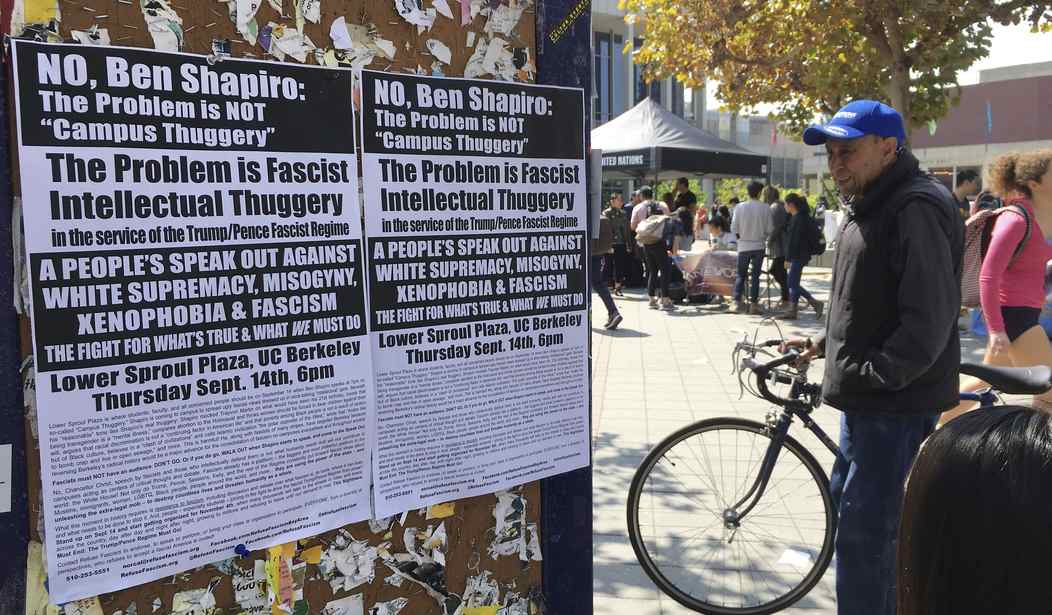If that headline sounds familiar, there’s a reason. A survey of college students conducted by John Villasenor for the Brookings Institute made waves online two weeks ago when Villasenor claimed to have found that no fewer than 19 percent of the Leaders Of Tomorrow supported the idea of a group using violence to silence a speaker whom it opposes. That was intolerably, even implausibly high; stories emerged afterward attacking Villasenor’s methodology and calling the poll “junk science” because it used an opt-in online panel.
YouGov decided to test Villasenor’s results by asking similar questions, albeit this time of the entire U.S. adult population, not just students. YouGov also conducts opt-in online panels for its polls but it uses sample matching and weights its samples to try to replicate the U.S. population demographically. Question one: Is it ever appropriate to use violence to shut down a speaker? Some American adults say yes — but the percentage is less than half of what Villasenor found among college kids:

The percentage of adults who think it’s okay to shout down a speaker you oppose is also far below what Villasenor detected among students. In his study, an amazing 51 percent believed that would be appropriate; in YouGov’s poll of adults, “only” 22 percent support the heckler’s veto. Unsurprisingly, Democrats are much more likely to do so than Republicans, 35 percent versus 14 percent.
Villasenor asked another, bigger-picture question in his poll. Given a choice between a “positive” learning environment on campus that prohibits speech that’s “offensive or biased against certain groups of people” and an “open” learning environment where students are exposed to all types of speech, which would they prefer? College students broke 53/47 for option one. YouGov asked the same question of American adults:

Adults generally are much less likely than college kids to support the more repressive “positive” environment. But Democrats are not, splitting 45/37 in favor. Interestingly, self-described “liberals” agree with Republicans that the “open” learning environment is preferable by a margin of 35/50. The reason Democrats overall prefer the “positive” environment is because black and Latino voters support it — strongly in the case of blacks (50/20), more marginally in the case of Latinos (44/32). Presumably racial minorities believe they’re the ones who are most likely to suffer on campus if “biased” speech isn’t prohibited. Blacks were likewise one of the few groups on balance to support banning college speakers whose words are deemed “hateful” or “offensive” by some per a poll conducted earlier this year by Morning Consult. Probably not coincidentally, blacks and Latinos are also far more likely than whites to support banning “hate speech” both on campus and off.
What about young adults, though? If Villasenor’s survey is right that college students are more supportive of oppressive speech rules and norms than you’d think, you’d expect polling among the 18-29 group in YouGov’s survey to show higher-than-average support for restricting speech as well. And you do see that — but the numbers aren’t wildly different. Young adults are a little less likely than average to say universities should protect freedom of expression (72 percent versus 76 percent among all adults) and a little more likely to say that it’s okay to shout down speakers (28 percent versus 22 percent) and to use violence to silence speakers (14 percent versus eight percent). But they’re also slightly *less* likely than the overall population to prefer a “positive” learning environment to an “open” one. It could be that very young, i.e. college-aged, adults support speech restrictions at the rates claimed in Villasenor’s poll and then mellow out dramatically once they graduate and are out of the far-left fishbowl. That would explain why the 18-29 group overall is a bit worse than adults on average but not starkly so. But given the small subsample and resulting higher margin of error in polling the group, it’s also possible that the differences between younger adults and the overall population are statistically insignificant, just polling “noise.”
Exit question: We should probably worry that we now have two separate surveys putting support among young Americans for silencing speakers with violence in the teens percentage-wise, huh?








Join the conversation as a VIP Member